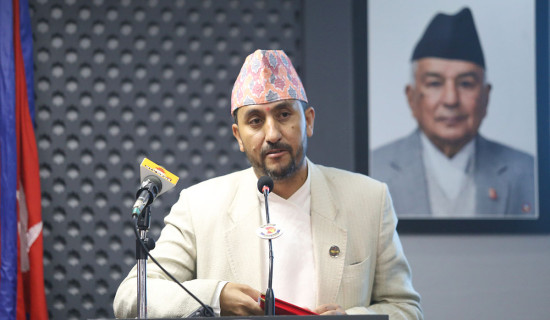- Monday, 29 September 2025
Invest In Universal Health Coverage
In today's world, where health crises can strike unexpectedly and medical costs continue to rise, the significance of universal health coverage cannot be overstated. Universal health coverage, which ensures that all individuals have access to essential health services without suffering financial hardship, is not just a matter of social justice but also a key driver of economic development and societal well-being.
Universal health coverage (UHC) is a concept that has gained significant attention in recent years. It refers to a system where all individuals and communities have access to quality health services without suffering financial hardship. UHC is a fundamental human right and a critical component of sustainable development. It is essential for achieving the United Nations’ Sustainable Development Goals (SDGs), particularly SDG 3, which aims to ensure healthy lives and promote well-being for all at all ages. UHC is also critical for reducing poverty and inequality, as it ensures that everyone has access to essential health services, regardless of their income or social status.
Importance
Universal health coverage is a fundamental human right that promotes health equity. It guarantees that everyone, regardless of their socio-economic status, can access quality healthcare services. By eliminating financial barriers, it prevents the marginalisation of vulnerable populations and reduces health disparities. When everyone has equal access to healthcare, society becomes fairer and more inclusive.
Universal health coverage plays a pivotal role in fostering economic stability. By providing affordable healthcare to all citizens, it prevents families from falling into poverty due to medical expenses. When individuals are not burdened by exorbitant healthcare costs, they can invest in education, housing, and other essential needs, thus stimulating economic growth. Additionally, a healthy workforce is more productive, leading to increased economic output and competitiveness.
The COVID-19 pandemic has highlighted the urgent need for universal health coverage. A robust healthcare system that covers everyone is crucial for early detection, rapid response, and effective management of outbreaks. Universal health coverage ensures that individuals can access testing, treatment, and vaccines without financial barriers, reducing the spread of infectious diseases and protecting public health.
Universal health coverage significantly improves health outcomes. When individuals have access to preventive care, early diagnosis, and timely treatment, diseases can be detected and managed at an early stage, leading to better health outcomes and increased life expectancy. It also promotes a healthier population, reducing the burden on healthcare systems and improving overall public health indicators. Universal health coverage strengthens social cohesion by fostering a sense of solidarity and shared responsibility. When everyone contributes to a common healthcare system, it creates a sense of collective well-being and social support. This enhances social stability, reduces inequality, and promotes social harmony.
Despite the importance of UHC, many countries still struggle to provide universal access to health services. In many low- and middle-income countries, health systems are underfunded, understaffed, and lack essential medicines and equipment. This results in poor health outcomes, high mortality rates, and significant financial burden on individuals and families. To achieve UHC, countries need to invest in their health systems and prioritise health as a fundamental human right. This requires a comprehensive approach that includes strengthening health infrastructure, increasing the number of health workers, improving the quality of health services, and ensuring that essential medicines and equipment are available and affordable.
In addition, UHC requires a strong commitment from governments to provide financial protection to their citizens. This can be achieved through various mechanisms, such as social health insurance, tax-funded health systems, or a combination of both. Governments also need to ensure that health services are accessible to all, including marginalised and vulnerable populations. UHC is not only a moral imperative but also makes economic sense. It can lead to significant cost savings by reducing the burden of disease and preventing catastrophic health expenditures. It can also contribute to economic growth by improving the health and productivity of the population.
Nepal has made significant strides in recent years towards achieving universal health coverage (UHC). The country has implemented a number of policies and programmes aimed at improving access to healthcare services for all its citizens, regardless of their income or social status. One of the key initiatives undertaken by the Nepali government is the establishment of a national health insurance programme. The programme, known as the National Health Insurance Programme (NHIP), was launched in 2016 and aims to provide affordable health insurance coverage to all Nepalese citizens.
Small premium
Under the NHIP, citizens are required to pay a small premium, based on their income level, in order to access a range of healthcare services. The programme covers a wide range of services, including primary care, hospitalisation, and emergency care. In addition to the NHIP, Nepal has also implemented a number of other programmes aimed at improving access to healthcare services. These include the establishment of community health centers, the expansion of telemedicine services, and the provision of free healthcare services to pregnant women and children under the age of five.
Universal health coverage is not just a moral imperative; it is a smart investment in the well-being and prosperity of nations. By ensuring that all individuals have access to affordable, quality healthcare, governments can create a fairer, more resilient society. Universal health coverage is a critical component of sustainable development, economic growth, and social progress. It is high time for governments worldwide to prioritise and invest in universal health coverage to build a healthier and more equitable future for all.
(Dr. Lohani is the executive director at Health Concern. lohanis@gmail.com)
















